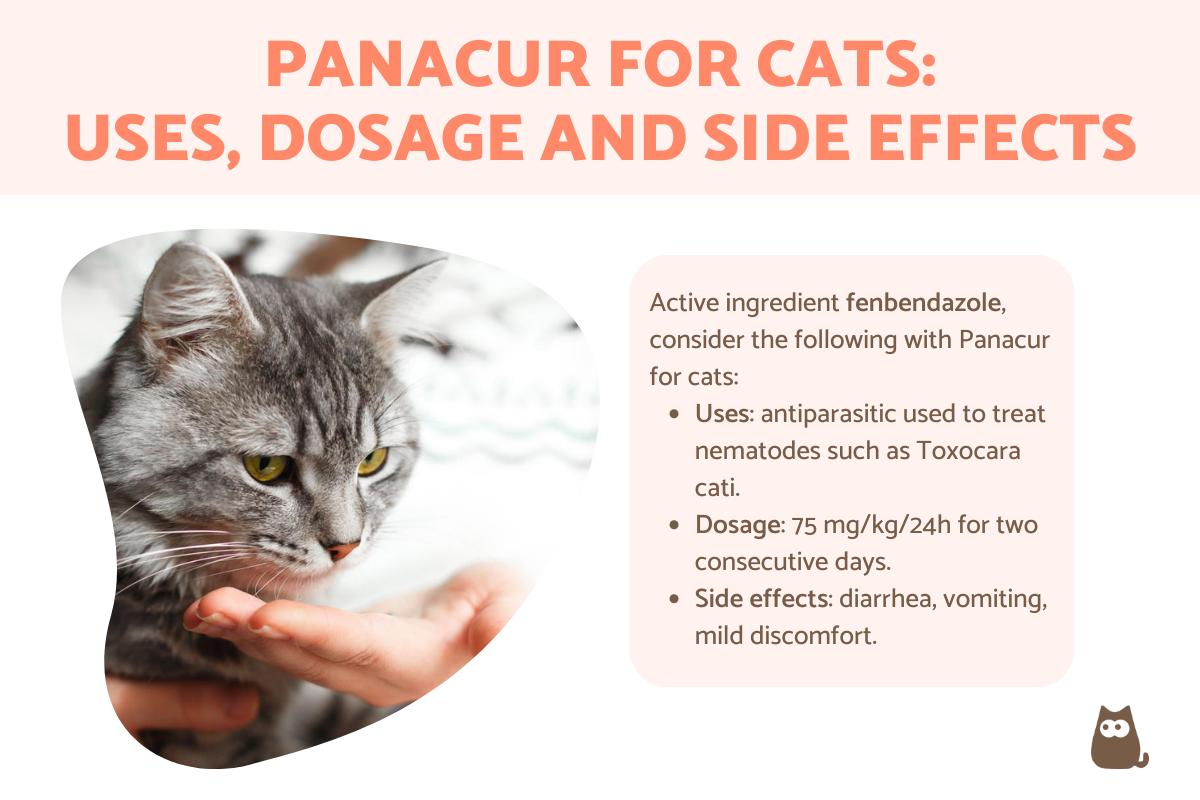Panacur for Cats - Uses, Dosage and Side Effects



See files for Cats
Parasites are a major threat to our cat's well-being. Unfortunately, there are many different types which can affect them both internally and externally. This is why it is important to protect our cats as best we can. Even in the home, cats can become infested with parasites such as tapeworms and roundworms due to the eggs adhering to our clothes and shoes. While we should use preventive deworming to stop infestations from happening, it is always possible our cat can become infested. This is why antiparasitic and parasiticide drugs such as fenbendazole are used, a product which is often sold under the brand name Panacur.
At AnimalWised, we look at Panacur for cats and understand the uses, dosage and side effects of fenbendazole. This is a product which can be sold over the counter, but it is always best to consult your veterinarian before use.
What is Panacur for cats?
Panacur is the brand name of a drug marketed as an antiparasitic for several domestic animal species, including cats. It is also sold under the name Safe-Guard in the USA. There are two commercialized formats for felines: a paste for oral ingestion and oral tablets.
The active ingredient in Panacur is fenbendazole, an antiparasitic belonging to the group of benzimidazoles. It is considered a broad-spectrum anthelmintic, i.e. it specifically destroys parasitical worms. The action of fenbendazole consists in altering the activity of the enzyme fumarate reductase, which is involved in the metabolism of the parasite's glycogen
Glycogen is an essential nutrient for a parasitical worm's survival. Fenbendazole produces a reduction in the glycogen available to the parasite, causing its death. It also acts against adult parasites, larvae and eggs, being considered a complete dewormer.
Where to buy Panacur for cats
You can buy Panacur for cats and other animals in pharmacies and veterinary clinics. It is an over-the-counter drug which can be bought directly from the pharmacist. You can use the link below to purchase Panacur sold for canines. This can be used in cats, but only after consultation with a veterinarian:
What is Panacur used for in cats?
Panacur in cats serves as an anthelmintic for internal deworming of cats. Panacur is useful for treating gastrointestinal nematode infestations in both kittens and adult felines. The internal parasites that fenbendazole can kill in cats include the following:
- Toxocara cati
- Toxascaris leonina
- Ancylostoma tubaeforme
- Aelurostrongylus abstrusus
- Taenia spp.
Learn about all the intestinal parasites that affect these animals and the symptoms they produce in our guide to intestinal parasites in cats.
Panacur dosage for cats
As we have mentioned, there are two main formulations of Panacur for cats, a paste format and a tablet format. Next, we will discuss the doses of each drug formulation for these animals.
Panacur oral paste dose 187.5 mg/g
Each syringe of oral Panacur can hold up to 4.8 g of paste, which is equivalent to 900 mg of fenbendazole. It has 18 graduations in each syringe, each containing 50 mg of fenbendazole. These are used to ensure the correct Panacur dose is administered. The use of Panacur oral paste is suitable for cats weighing up to 6 kg. If they weigh more, a single syringe is not enough since the dose of this oral paste for adult cats is 75 mg fenbendazole/kg/24h for two consecutive days.
Taking into account the mg of fenbendazole per graduation, depending on the weight of the cat, the daily dose of Panacur in adult cats will be as follows:
- Daily dose for 2 kg cats: 3 graduations over 2 days.
- Daily dose for cats from 2.1 to 4 kg: 6 graduations over 2 days.
- Daily dose for cats from 4.1 to 6 kg: 9 graduations over 2 days.
In kittens, the fenbendazole dose is 50 mg fenbendazole/kg/ 24h for three consecutive days. This means the daily dose of Panacur in kittens would be as follows:
- Daily dose for kittens from 1 to 2 kg: 2 graduations for 3 days.
- Daily dose for kittens from 2.1 to 3 kg: 3 graduations during 3 days.
- Daily dose for kittens from 3.1 to 4 kg: 4 graduations over 3 days.
- Daily dose for kittens from 4.1 to 5 kg: 5 graduations during 3 days.
- Daily dose for kittens from 5.1 to 6 kg: 6 graduations over 3 days.
Dose of Panacur tablets 250 mg
Panacur tablets can be given with a small amount of their usual food, especially wet food. It can also be dissolved in water and administered with a syringe. The dose of Panacur tablets can be given in a single administration or for three or five consecutive days. The dosage of Panacur tablets in cats is as follows, depending on their frequency of administration:
- Single dose: 1 tablet for every 2.5 kg of the cat's weight.
- Dose for three consecutive days: 1 tablet for every 5 kg.
- Dose for five consecutive days: 1 tablet for every 12.5 kg.
If you do not feel confident about giving tablets to a cat, we can help. Here we provide a helpful guide to giving pills to cats.

Contraindications and side effects of Panacur in cats
Panacur is considered a safe drug without contraindications in cats. In fact, it is not even harmful in pregnant, lactating or very young cats. It can be used effectively and safely at any time in the cat's life.
Although safe, certain side effects can appear. Both Panacur in oral paste and Panacur in tablet form can cause digestive disorders such as abdominal discomfort, vomiting and mild diarrhea. Diarrhea is more moderate in the case of oral paste administration than in tablets. An allergic reaction related to Panacur tablets has been observed in dogs, but this has not been the case in felines.
Now that you know how this antiparasitic works and which parasites it works against, you can learn more general information in our article on the importance of deworming animals.
This article is purely informative. AnimalWised does not have the authority to prescribe any veterinary treatment or create a diagnosis. We invite you to take your pet to the veterinarian if they are suffering from any condition or pain.
If you want to read similar articles to Panacur for Cats - Uses, Dosage and Side Effects, we recommend you visit our Medicine category.
- Spanish Agency for Medicines and Health Products. PANACUR ORAL PASTA 187.5 mg/g technical data sheet FOR DOGS AND CATS. Retrieved from: https://cimavet.aemps.es/cimavet/pdfs/es/ft/1624+ESP/FT_1624+ESP.pdf
- Spanish Agency for Medicines and Health Products. Technical data sheet for Panacur 250 tablets. Retrieved from: https://cimavet.aemps.es/cimavet/pdfs/es/p/1085+ESP/P_1085+ESP.pdf






